Module 7
1. Module 7
1.32. Page 4
Module 7: Lesson 6
 Self-Check
Self-Check
Apply the sine ratio to find unknown sides and angles.
SC 1. The Broadway Bridge in Portland, Oregon, was constructed in 1913 over the Willamette River. Two spans, each 42 m in length, may be raised to an angle of 89° to the horizontal.
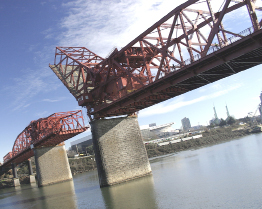
© Charles Noble/shutterstock
In the photograph, one span is being raised. Suppose the span is raised to the full 89°. This situation is represented by this diagram.
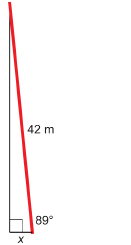
Use the diagram to determine how far the upper end of the span would extend towards the river beyond the lower end. Calculate this distance to one decimal place.
SC 2. Simon is framing his basement. To nail a vertical stud (2-by-4) to the horizontal bottom plate, Simon angles a ![]() -in nail 30° to the vertical stud and 2 in from the joint.
-in nail 30° to the vertical stud and 2 in from the joint.
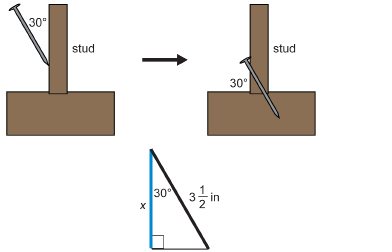
Simon says that when the nail is driven in at 30°, the tip will be at least 1 in below the surface of the bottom plate.
Is Simon correct?
SC 3. Jim and Angus are part of a painting crew preparing to work on the exterior of an apartment building. They have just unloaded a 4-m ladder and are placing the ladder against an exterior wall.
Jim says, “I know that safety experts recommend ladders be positioned at an angle of 75° with the ground. But how do I determine that angle?”
Angus laughs, “Well, we don’t have a clinometer in the truck, do we?”
Can you help Jim and Angus by telling them how far to place the foot of the ladder from the wall? Show your solution.
SC 4. If the foot of the ladder described in SC 3 were placed 1.5 m from the wall, what would the angle be between the ladder and the ground?
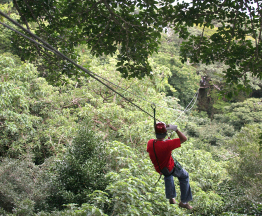
© Brandon Stein/shutterstock
SC 5. From the jungle canopy of Costa Rica to the Yukon Territory, zip lining is becoming a very popular activity. How long must a zip line be to carry people a horizontal distance of 250 m if the angle of depression from the upper platform to the end of the line is 5°? Round to the nearest metre.
Before you get started, review “Angle of Depression” as a refresher.

 Mastering Concepts
Mastering Concepts
As shown in the photograph, a lean-to is built against one wall of a barn.
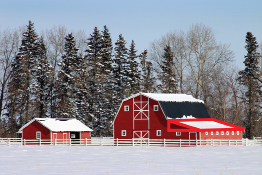
© Bellajay/shutterstock
The roof of the lean-to is 30 ft long. Its horizontal width is 12 ft. As shown in the diagram, the roof is inclined at 20° to the horizontal.

To the nearest square foot, what is the area of the lean-to’s roof?